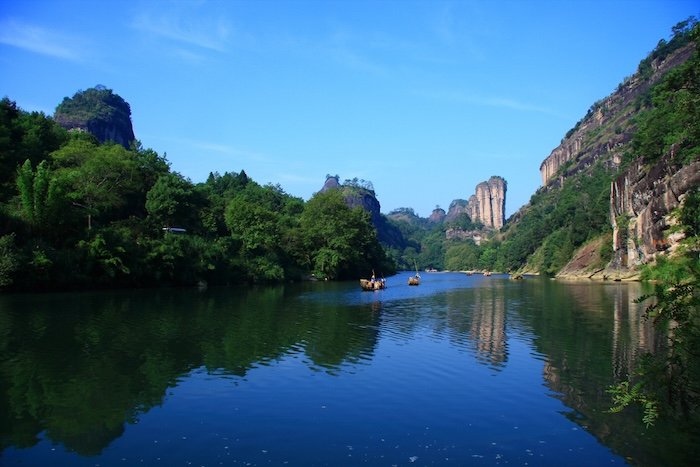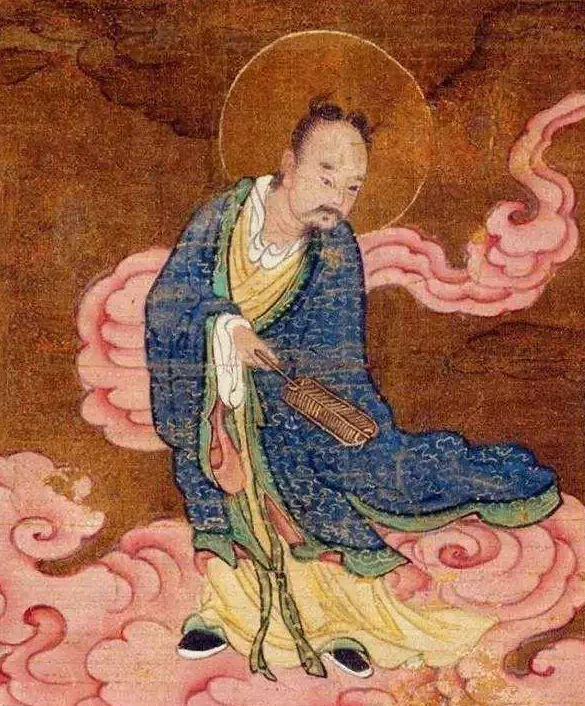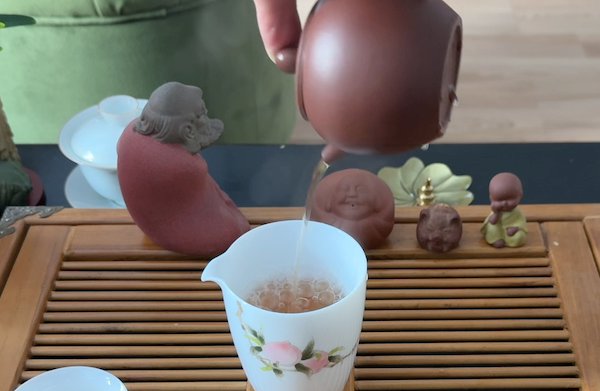
Bai Jiguan – The Daoist Wuyi Cliff Tea
My favorite type of teas to drink in the colder parts of the year are Wuyi Rock (Cliff) Oolongs (we are talking true tea here, i.e. the camellia sinensis plant, not herbal teas). From the Wuyi Mountain area of Fujian, China, these are legendary oolongs known for their rich, smooth roasted flavors that come about due to the charcoal roasting process that they go through.

The tea gardens are nestled amongst the cliffs of the Wuyi mountains, hence the name. The soil that the tea plants grow in is pristine and rich in minerals. The cha qi 茶气 (energetic property of the tea) of Wuyi Rock teas is easily experienced and is felt as a gentle warmth that does not cause too much dryness in the body, making them great for wintertime.

The Wuyi Mountains are both a beautiful and biodiverse nature reserve, as well as an important historical center for both the Buddhist and Daoist traditions. So it’s not surprising that the names and origin stories of many of the teas are linked with Buddhist and Daoist culture. Of the many Wuyi Rock Oolongs, the Bai Jiguan 白鸡冠 (literally, “White Cockscomb”) is considered to be one of the “Four Famous Mingcong Teas of Wuyi Mountain” (武夷山四大名枞) and is the one that is known as the “Daoist Tea.” It is linked to Bai Yuchan 白玉蟾, a key figure in the Song Dynasty Southern Jin Dan (金丹派) (jin dan 金丹 “Golden Elixir”, i.e. Daoist alchemy) as well as leifa (雷法) “thunder ritual” traditions.

Bai Yuchan is associated with one of the origin stories of Bai Jiguan tea. It is said that he was presiding over the Daoist Temple at the Zhi Zhi An Nunnery (止止庵道观) under the Da Wang Peak (大王峰) in the Wuyi Mountains when he accidentally found a tea tree in the White Snake Cave (白蛇洞) and later decided to breed it. The edges of the tea leaves were shaped like a cockscomb and the tender buds were a yellow-white color, so he named it “White Cockscomb” (Bai Jiguan).
Daoists in the Wuyi Mountains have a long history with tea cultivation and tea drinking. They considered tea to be a type of elixir that could aid in their practice by assisting in the regulation of qi 气 and more generally by supporting their overall health. Tea was considered an aid to the kidneys in detoxifying the body as well as an effective remedy for the treatment of what is known in Chinese medicine as pathogenic wind-heat “feng re” (风热) and excessive phlegm “tan” (痰).

Bai Yuchan was not only a famous master of Daoist alchemy, but was also known for his poetry and calligraphy. In one famous reference to Ba Ji Guan, in a ci (詞) poem he wrote about his experience drinking the tea:
“I can feel the wind under my wings, and now want to fly off to meet the immortals on Mount Penglai” (两腋清风起,我欲上蓬莱).
In “Tea Song” (茶歌), he wrote:
“It tastes like sweet dew, better than ti hu1, serve it and suddenly feel sunk like Asu2, my body is light and now I want to ascend to heavenly realms, but I didn’t know that there is no tea in heaven.” (味如甘露胜醍醐, 服之顿觉沉阿苏. 身轻便欲登天衢, 不知天上有茶无).
- Ti hu refers to clarified butter that is also a Buddhist metaphor for Buddha nature (佛性).
- Asu is a reference to “sinking agarwood,” a fragrant wood used for Daoist incense.
Tea plants are very good at absorbing the qi of their surroundings, and so tea that is grown in special natural environments, sacred places, or around monks who dedicate their life to cultivation, are thought to contain a special type of qi that can be imparted on to the tea drinker. Drinking a little bit of high-quality tea before a qigong session can also help beginners to more easily feel the flow of qi during practice.

Tea is a healthy drink that has many benefits, but like most things, it is best in moderation and can certainly be detrimental if overdone. Usually, I tend to just drink a small amount of high-quality tea early in the day, and try to avoid getting “tea drunk.”
I’m currently drinking some Bai Jiguan from Wuyi Origin which, for friends residing in the USA, is easily obtainable from Trident’s online tea shop.

